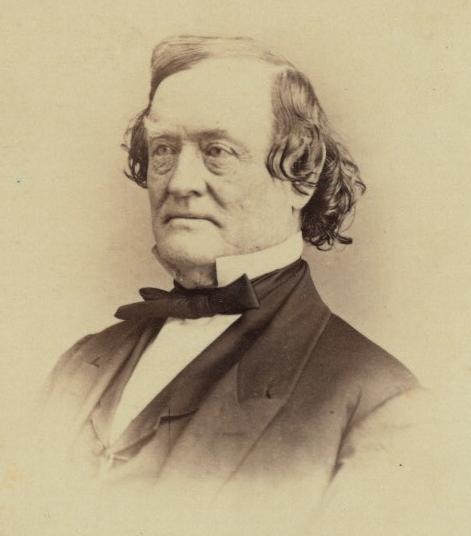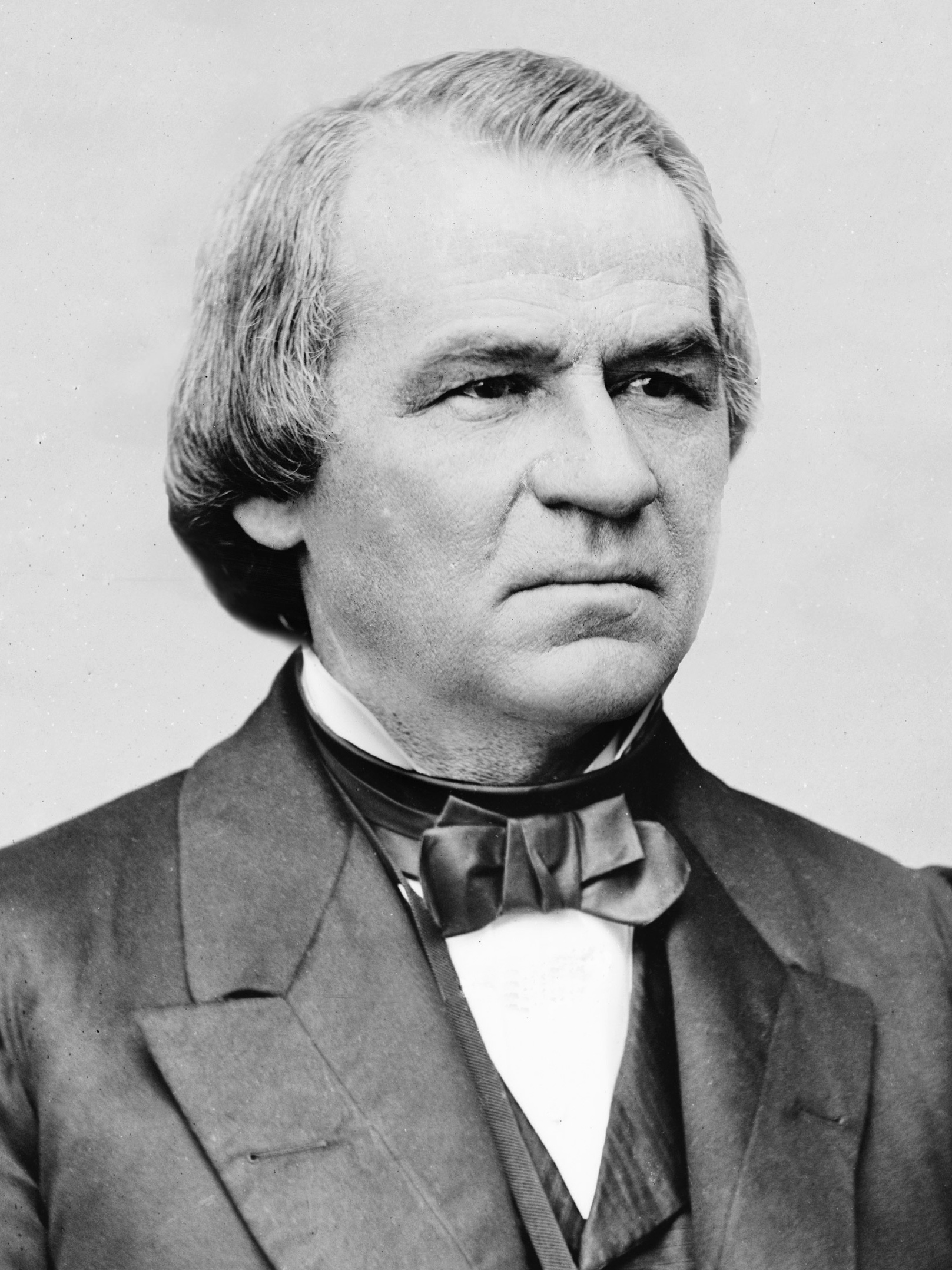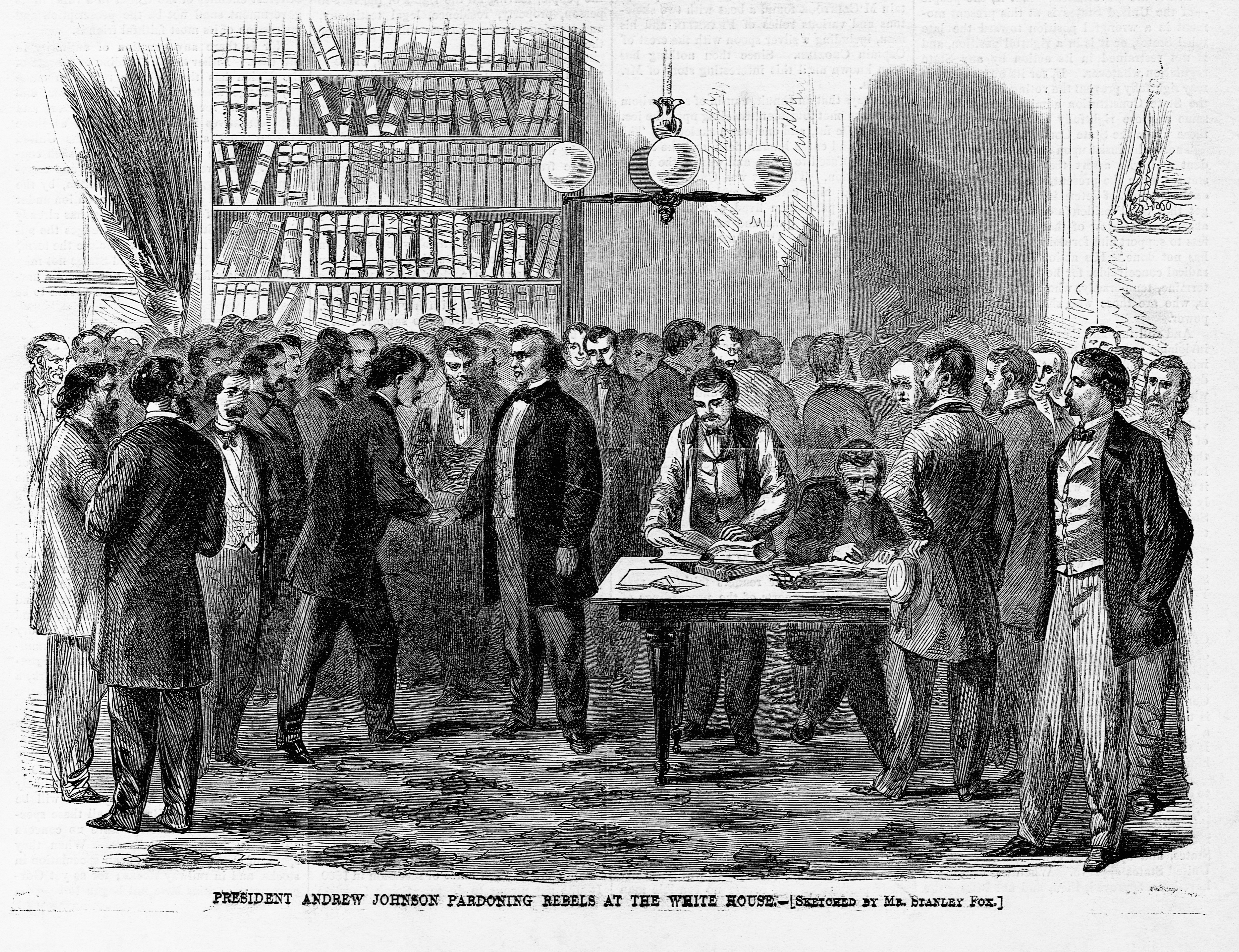|
Second Impeachment Inquiry Against Andrew Johnson
The second impeachment inquiry against Andrew Johnson was an Impeachment inquiry in the United States, impeachment inquiry against United States President Andrew Johnson. It followed First impeachment inquiry against Andrew Johnson, a previous inquiry in 1867. The second inquiry, unlike the first (which was run by the House Committee on the Judiciary), was run by the House Select Committee on Reconstruction. The second inquiry ran from its authorization on January 27, 1868, until the House Select Committee on Reconstruction reported to Congress on February 22, 1868. By early February, it appeared the prospect of an Federal impeachment in the United States, impeachment advancing was improbable. This changed when, on February 21, 1868, Johnson attempted to dismiss and replace United States Secretary of War, Secretary of War Edwin Stanton in violation of the Tenure of Office Act (1867), Tenure of Office Act. That day, an impeachment resolution was forwarded to the select committee. ... [...More Info...] [...Related Items...] OR: [Wikipedia] [Google] [Baidu] |
Andrew Johnson
Andrew Johnson (December 29, 1808July 31, 1875) was the 17th president of the United States, serving from 1865 to 1869. The 16th vice president, he assumed the presidency following the assassination of Abraham Lincoln. Johnson was a Southern Democrat who ran with Lincoln on the National Union Party ticket in the 1864 presidential election, coming to office as the American Civil War concluded. Johnson favored quick restoration of the seceded states to the Union without protection for the newly freed people who were formerly enslaved, as well as pardoning ex-Confederates. This led to conflict with the Republican Party-dominated U.S. Congress, culminating in his impeachment by the House of Representatives in 1868. He was acquitted in the Senate by one vote. Johnson was born into poverty and never attended school. He was apprenticed as a tailor and worked in several frontier towns before settling in Greeneville, Tennessee, serving as an alderman and mayor before bei ... [...More Info...] [...Related Items...] OR: [Wikipedia] [Google] [Baidu] |
Impeachment Of Andrew Johnson
The Federal impeachment in the United States, impeachment of Andrew Johnson for "high crimes and misdemeanors" was initiated by the United States House of Representatives on February 24, 1868. The alleged high crimes and misdemeanors were afterwards specified in Articles of impeachment adopted against Andrew Johnson, eleven articles of impeachment adopted by the House on March 2 and 3, 1868. The primary charge against Johnson was that he had violated the Tenure of Office Act (1867), Tenure of Office Act. Specifically, that he had acted to remove Edwin Stanton from the position of United States Secretary of War, Secretary of War and to replace him with Brevet (military), Brevet Major General Lorenzo Thomas as secretary of war ''ad interim''. The Tenure of Office Act had been passed by United States Congress, Congress in March 1867 over Johnson's veto with the primary intent of protecting Stanton from being fired without the Senate's consent. Stanton often sided with the Radical Re ... [...More Info...] [...Related Items...] OR: [Wikipedia] [Google] [Baidu] |
40th Congress
The 40th United States Congress was a meeting of the legislative branch of the United States federal government, consisting of the United States Senate and the United States House of Representatives. It met in Washington, D.C. from March 4, 1867, to March 4, 1869, during the third and fourth years of Andrew Johnson's presidency. The apportionment of seats in the House of Representatives was based on the 1860 United States census. Both chambers had a Republican majority. In the Senate, the Republicans had the largest majority a party has ever held. This Congress was held during the Reconstruction era after the Civil War and U.S. President Abraham Lincoln's assassination. Arkansas, Florida, Alabama, North Carolina, Louisiana, and South Carolina were readmitted to representation in both the Senate and the House. Georgia was readmitted with representation in the House only. The Republican majority passed an amendment that became the 15th Amendment for voting rights. Major event ... [...More Info...] [...Related Items...] OR: [Wikipedia] [Google] [Baidu] |
39th Congress
The 39th United States Congress was a meeting of the legislative branch of the United States federal government, consisting of the United States Senate and the United States House of Representatives. It met in Washington, D.C., from March 4, 1865, to March 4, 1867, during Abraham Lincoln's final month as president, and the first two years of the administration of his successor, Andrew Johnson. The apportionment of seats in this House of Representatives was based on the 1860 United States census. Both chambers had a Republican majority. Major events * March 4, 1865: Second inauguration of President Abraham Lincoln. * April 9, 1865: Surrender of Confederate forces at Appomattox Court House, effectively ending the American Civil War * April 15, 1865: Assassination of President Abraham Lincoln, Vice President Andrew Johnson became President of the United States * December 11, 1865: Creation of the House Appropriations Committee and the House Banking and Commerce Committee, re ... [...More Info...] [...Related Items...] OR: [Wikipedia] [Google] [Baidu] |
Veto Power In The United States
In the United States, the president can use the veto power to prevent a bill passed by the Congress from becoming law. Congress can override the veto by a two-thirds vote of both chambers. All state and territorial governors have a similar veto power, as do some mayors and county executives. In many states and territories the governor has additional veto powers, including line-item, amendatory and reduction vetoes. Veto powers also exist in some, but not all, tribal governments. In federal government A bill that is passed by both houses of Congress is presented to the president. Presidents approve of legislation by signing it into law. If the president does not approve of the bill and chooses not to sign, they may return it unsigned, within ten days, excluding Sundays, to the house of the United States Congress in which it originated, while Congress is in session. The president is constitutionally required to state any objections to the bill in writing, and Congress is requi ... [...More Info...] [...Related Items...] OR: [Wikipedia] [Google] [Baidu] |
Pardons For Ex-Confederates
Both during and after the American Civil War, pardons for ex-Confederate States of America, Confederates were given by US presidents Abraham Lincoln and Andrew Johnson and were usually extended for those who had served in the military above the rank of colonel or civilians who had exercised political power under the Congress of the Confederate States, Confederate government. The Federal pardons in the United States, power to pardon offences to the US government was given to the chief executive in the US Constitution under Article Two of the United States Constitution#Clause 1: Command of military; Opinions of cabinet secretaries; Pardons, Article II. Abraham Lincoln On December 8, 1863, in his annual message to United States Congress, Congress, President Lincoln outlined his plans for Reconstruction era, reconstruction of the Southern United States, South, which included terms for amnesty to former Confederates. A pardon would require an oath of allegiance, but it would not restore ... [...More Info...] [...Related Items...] OR: [Wikipedia] [Google] [Baidu] |
James Mitchell Ashley
James Mitchell Ashley (November 14, 1824September 16, 1896) was an American politician and abolitionist. A member of the Republican Party, Ashley served as a member of the United States House of Representatives from Ohio during the American Civil War, where he became a leader of the Radical Republicans and pushed for passage of the Thirteenth Amendment, ending slavery in the United States. He also authored the resolution which started the first impeachment inquiry against Andrew Johnson. After the war, he served as Governor of the Montana Territory and president of the Ann Arbor Railroad. Early and family life Ashley was born in Allegheny County, Pennsylvania, to John Ashley, a bookbinder and Campbellite preacher who evangelized in Kentucky and West Virginia, and his wife Mary A. (Kilpatrick) Ashley of Kentucky. As a boy in the Ohio River valley, Ashley saw coffles of chained slaves being walked to the Deep South, boys his own age being sold, and even white men who refus ... [...More Info...] [...Related Items...] OR: [Wikipedia] [Google] [Baidu] |
John R
John R. (born John Richbourg, August 20, 1910 – February 15, 1986) was an American radio disc jockey who attained fame in the 1950s and 1960s for playing rhythm and blues music on Nashville radio station WLAC. He was also a notable record producer and artist manager. Richbourg was arguably the most popular and charismatic of the four announcers at WLAC who showcased popular African-American music in nightly programs from the late 1940s to the early 1970s. (The other three were Gene Nobles, Herman Grizzard, and Bill "Hoss" Allen.) Later rock music disc jockeys, such as Alan Freed and Wolfman Jack, mimicked Richbourg's practice of using speech that simulated African-American street language of the mid-twentieth century. Richbourg's highly stylized approach to on-air presentation of both music and advertising earned him popularity, but it also created identity confusion. Because Richbourg and fellow disc jockey Allen used African-American speech patterns, many listeners thought t ... [...More Info...] [...Related Items...] OR: [Wikipedia] [Google] [Baidu] |
Benjamin F
Benjamin ( ''Bīnyāmīn''; "Son of (the) right") blue letter bible: https://www.blueletterbible.org/lexicon/h3225/kjv/wlc/0-1/ H3225 - yāmîn - Strong's Hebrew Lexicon (kjv) was the younger of the two sons of Jacob and Rachel, and Jacob's twelfth and youngest son overall in Jewish, Christian and Islamic tradition. He was also considered the progenitor of the Israelite Tribe of Benjamin. Unlike Rachel's first son, Joseph, Benjamin was born in Canaan according to biblical narrative. In the Samaritan Pentateuch, Benjamin's name appears as "" (Samaritan Hebrew: , "son of days"). In the Quran, Benjamin is referred to as a righteous young child, who remained with Jacob when the older brothers plotted against Joseph. Later rabbinic traditions name him as one of four ancient Israelites who died without sin, the other three being Chileab, Jesse and Amram. Name The name is first mentioned in letters from King Sîn-kāšid of Uruk (1801–1771 BC), who called himself “King of Amnanu ... [...More Info...] [...Related Items...] OR: [Wikipedia] [Google] [Baidu] |
Reconstruction Era
The Reconstruction era was a period in History of the United States, US history that followed the American Civil War (1861-65) and was dominated by the legal, social, and political challenges of the Abolitionism in the United States, abolition of slavery and reintegration of the former Confederate States of America, Confederate States into the United States. Reconstruction Amendments, Three amendments were added to the United States Constitution to grant citizenship and equal civil rights to the Freedmen, newly freed slaves. To circumvent these, former Confederate states imposed poll taxes and literacy tests and engaged in terrorism in the United States, terrorism to intimidate and control African Americans and discourage or prevent them from voting. Throughout the war, the Union was confronted with the issue of how to administer captured areas and handle slaves escaping to Union lines. The United States Army played a vital role in establishing a Labour economics, free lab ... [...More Info...] [...Related Items...] OR: [Wikipedia] [Google] [Baidu] |
Moderate Republicans (Reconstruction Era)
Moderate Republicans were a faction of American politicians within the Republican Party from the party's founding before the American Civil War in 1854 until the end of Reconstruction in the Compromise of 1877. They were known for their loyal support of President Abraham Lincoln's war policies and opposed the more militant stances advocated by the Radical Republicans. According to historian Eric Foner, congressional leaders of the faction were James G. Blaine, John A. Bingham, William P. Fessenden, Lyman Trumbull, and John Sherman. Their constituencies were primarily residents of states outside New England, where Radical Republicanism garnered insufficient support. They included " Conservative Republicans" and the moderate Liberal Republicans, later also known as " Half-Breeds". During the 1864 United States presidential election, amidst the backdrop of the ongoing Civil War, moderate Republicans supported merging the Republican Party with the War Democrats ( Democrats w ... [...More Info...] [...Related Items...] OR: [Wikipedia] [Google] [Baidu] |







